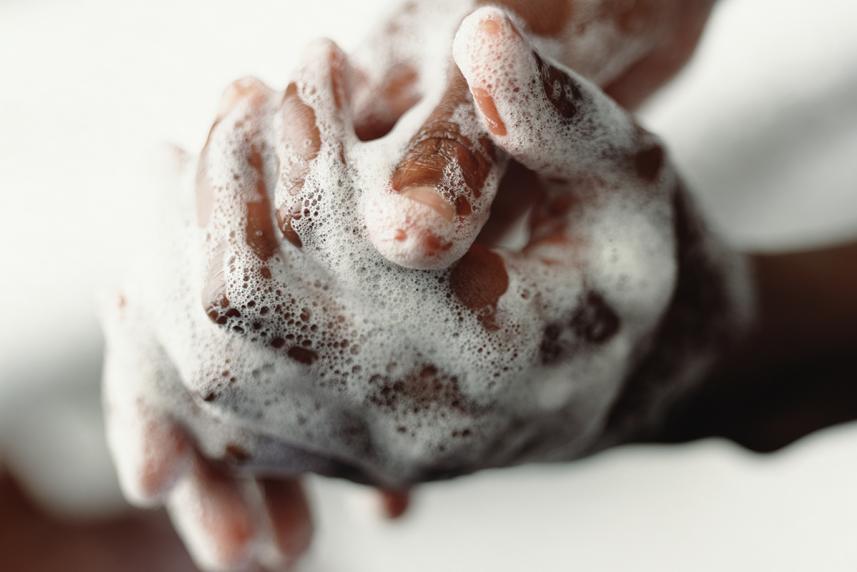
We have you covered — schedule a virtual visit today. No insurance required.

Lathering up is a key part of staying healthy. Here’s a refresher course on how to get your hands clean and germ-free — and why it matters.
We’ve all been dealing with the pandemic for more than 2 years. So you already know that handwashing is an important health habit. Proper handwashing can help the spread of everything from colds to COVID-19.
The pandemic may (hopefully) be starting to recede. But washing up is just as important as ever. “Handwashing is a very effective tool to remove unhealthy germs from your skin that could lead to infection,” says Chantel Strachan, MD. She’s an internist at ColumbiaDoctors Midtown in New York City.
When your hands are clean, you reduce the spread of many kinds of disease and infection, such as:
But are you washing your hands the right way? Here’s a refresher course on the key handwashing habits that can fend off germs — and help keep you from getting sick.
There are 5 simple steps you should follow every time you wash your hands, according to the Centers for Disease Control and Prevention.
Get them wet. Put your hands under clean running water.
Apply soap and lather up. You can use either a bar of soap or liquid soap, says Ruth M. Brocato, MD. She’s a primary care provider specializing in family medicine at Mercy Personal Physicians at Lutherville in Maryland. Use a generous amount. Next, rub your hands together vigorously to create a lather. Be sure to get the backs of your hands, beneath your nails and up to your wrists.
Scrub for at least 20 seconds. To keep track of time, sing the birthday song twice, or any other tune that you like. “Any song that is 20 seconds long will do the trick,” says Dr. Strachan.
Rinse. Rinse thoroughly to get all the soap off.
Dry off. Be sure to dry your hands well with a clean towel — or air-dry them.
You can shop for all your health essentials — including hand sanitizers and cold and flu products — at the Optum Store.
Now you’re a pro at proper washing technique. But there are some other habits to remember.
Wash often. “Knowing when to wash your hands is a common-sense thing,” says Nathan Price, MD. He’s a pediatric infectious disease specialist at the University of Arizona in Tucson. Whenever you come into contact with germs, lather up. That includes:
(Did you get sick anyway? Here’s how to know if it’s a cold, COVID or allergies.)
Know the germiest objects. Common items that we touch many times a day often carry the most germs. These can include:
Stock up on hand sanitizer. Opt for hand sanitizer when you don’t have access to a sink. Some examples: If you’re in the car, at your kids’ soccer game or at a store. Be sure the sanitizer is at least 60% alcohol. Hand sanitizers are easy to carry with you and quick to use. But how you use them is important.
You need to thoroughly coat each hand, including under your nails. “Make sure you get everything covered,” Dr. Price says. “Hand sanitizers work because you are applying a chemical that kills bacteria and viruses on your hands.” Some viruses are extra hardy and hand sanitizers are not as effective as soap and water against them. “But if you take your time and do it right, hand sanitizers are effective most of the time,” he says.
Choose the right soap. Soap and water work differently than sanitizer. The soap grabs onto the germs, and you can flush them right off your skin when you rinse with water, says Dr. Price. But there’s no need to buy antibacterial soap. Experts say there is no evidence that it works better than regular soap.
In a pinch, just use water. If you don’t have soap or hand sanitizer, water is better than nothing, says Dr. Brocato. Rub your hands together under running water and rinse them thoroughly.
Moisturize, if you want. Frequent handwashing can strip your hands of their natural moisture, notes Dr. Strachan. This is especially true if you are prone to dry skin. Applying moisturizer after washing can help protect your skin.
Don’t touch your face. One way people get sick is by touching a germy item (or person) and then touching their face. The germs can then enter your body through your mouth or nose.
Bottom line: Even if you’re in a hurry, take the time to wash your hands. Keeping them clean fights germs and can protect you and your family from getting sick.

We have you covered — schedule a virtual visit today. No insurance required.
Additional source
Proper handwashing: Centers for Disease Control and Prevention (2022). “When and How to Wash Your Hands”